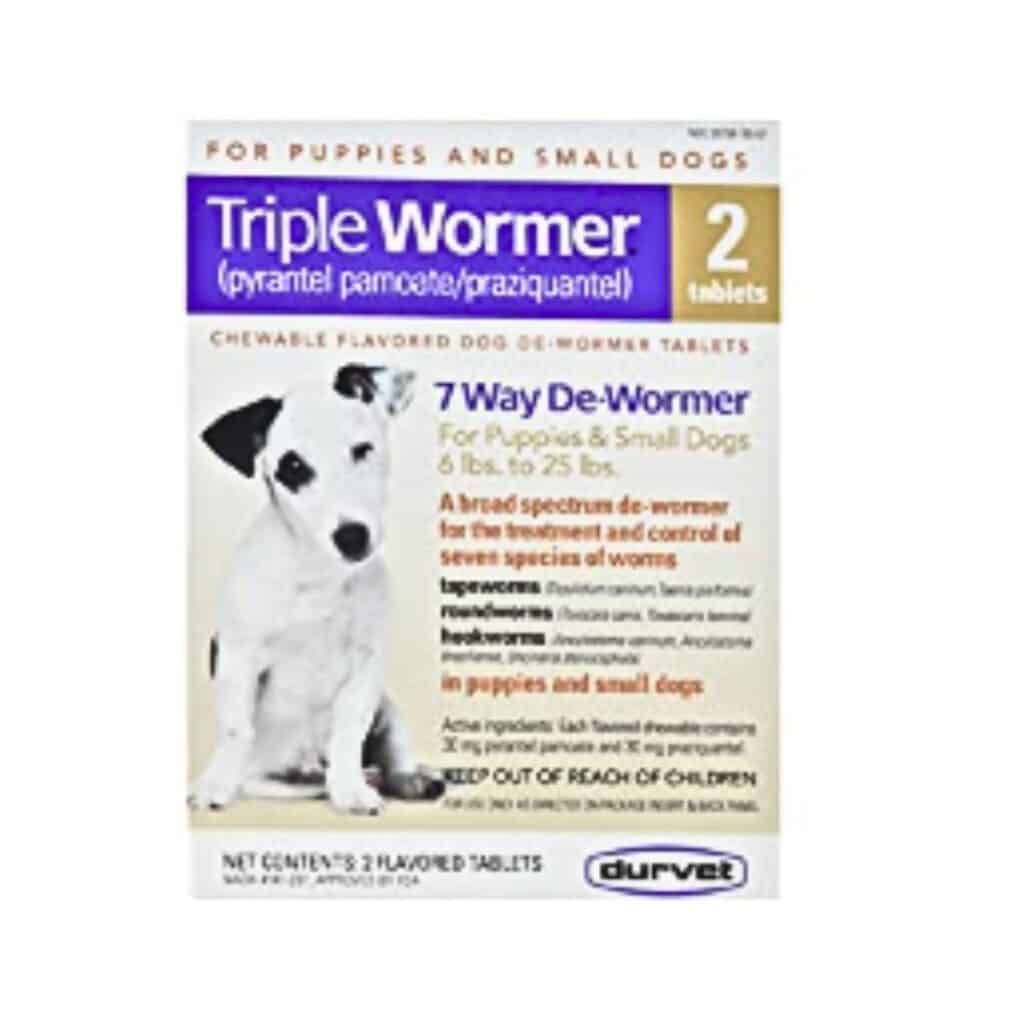When it comes to keeping your furry friend healthy, deworming is an important aspect of their care routine. Worms can cause serious health problems in dogs, such as weight loss, diarrhea, and anemia. At the same time, wormers contain chemicals that can and should be used with care and attention. So . . how often should you deworm your dog or puppy? Is there anything else you can do to prevent and detect worms in your dog? The answer depends on several factors, including their age, lifestyle, and risk of exposure to parasites. Read on to learn more!

Why Dog Deworming is Important
Deworming is an important aspect of pet care. Dogs can easily get infected with different types of worms, such as roundworms, hookworms, whipworms, and tapeworms. These parasites can cause a range of health problems, including diarrhea, vomiting, weight loss, and even death in severe cases.
Puppies are particularly vulnerable to worm infestations, as they can contract them from their mother’s milk or through contact with infected feces. It is recommended to start deworming puppies at two weeks of age and continue every two weeks until they are weaned. After that, they should be dewormed monthly until they are six months old, and then every three to six months as adults.
Adult dogs should also be dewormed regularly, especially those that spend time outdoors or have contact with other dogs. The frequency of deworming depends on the dog’s lifestyle and risk of exposure to worms. A general guideline is to deworm every three to six months, dog worm pet testing can reveal a lot about your dog’s situation and a necessary deworming schedule.
When to Deworm Your Puppy
Deworming your puppy is an essential part of their healthcare routine. Puppies are often born with worms, and they can easily contract them from their environment or other animals. Therefore, it is crucial to start a thoughtful deworming schedule for your puppy at the right time to prevent any health issues.
Deworming Schedule for Puppies
The recommended deworming schedule for puppies varies depending on their age. Here is a general guideline:
- 2 to 12 weeks of age: Deworm every two weeks
- 3 to 6 months of age: Deworm every month
- 6 months to 1 year of age: Deworm every two to three months
- Over 1 year of age: Deworm every three to six months
It is important to note that these are general guidelines, and pet worm testing may reveal that your pup has no worms or your veterinarian may recommend a different schedule based on your puppy’s individual needs and environment. Additionally, if your puppy is experiencing symptoms of worms, such as diarrhea or vomiting, they may require more frequent deworming.
When deworming your puppy, it is essential to use a high-quality dewormer recommended by your veterinarian or a natural method you have researched that we describe below.
Here is our favorite Triple Broad Spectrum Dewormer for small dogs and puppies available on Amazon here

By following a regular deworming schedule and practicing good hygiene, you can help keep your puppy healthy and happy.
Tips for Deworming Your Puppy
- Always follow the instructions on the dewormer package or as directed by your veterinarian.
- Weigh your puppy before administering the dewormer to ensure you give them the correct dosage.
- Make sure your puppy has access to plenty of water after taking the dewormer.
- Keep your puppy away from areas where they may be exposed to worms, such as areas with other dogs’ feces.
- Regularly clean up after your puppy to prevent the spread of worms.
By following these tips and deworming your puppy regularly, you can help keep them healthy and free of worms. Remember to consult with your veterinarian if you have any questions or concerns about your puppy’s health.
After deworming your puppy, you may notice worms in their stool for a few days. This is normal and indicates that the dewormer is working. However, if you continue to see worms in your puppy’s stool after a week, pet worm testing reveals that your dog still has worms or if your puppy shows signs of illness such as vomiting or diarrhea, your puppy may still be infected.

When to Deworm Your Adult Dog
Deworming is an important part of your adult dog’s health routine as well. Adult dogs can get worms from a variety of sources, including contaminated soil, infected feces, and fleas. It is important to know when to deworm your adult dog to keep them healthy and prevent the spread of parasites.
Deworming Schedule for Adult Dogs
The frequency of deworming your adult dog depends on their lifestyle, age, and health. Here are some general guidelines to follow:
- Adult dogs should be dewormed at least twice a year, or every six months.
- Dogs that are at higher risk of getting worms, such as those that have frequent contact with other dogs or live in areas with a high incidence of parasites, may need to be dewormed more often.
- Dogs that hunt or scavenge may also need more frequent deworming.
- Pregnant dogs should be dewormed before giving birth to prevent the transmission of worms to their puppies.
It is important to note that different types of worms require different types of dewormers. Your veterinarian can recommend the appropriate dewormer for your dog based on their specific needs.
Signs Your Dog May Need Deworming
In addition to following a deworming schedule, it is important to be aware of the signs that your adult dog may need to be dewormed. These signs include:
- Diarrhea
- Vomiting
- Weight loss
- A dull coat
- An increase in appetite
- Worms or worm segments in their feces
If you notice any of these signs in your dog, it is important to consult with your veterinarian to determine if deworming is necessary. We talk about the signs and symptoms of worms more in our article How to Tell if Your Dog Has Worms.

How to Deworm Your Puppy and Adult Dog
Here are some tips on how to deworm your puppy or adult dog and prevent a worm infestiation and the nasty signs and symptoms that follow with a worm infestation not to mention the potential infestation of family members.
Deworming Methods
There are several methods of deworming your puppy and adult dog, including:
Liquid Dewormers
Liquid dewormers are easy to administer and are often recommended for puppies. They come with a syringe that allows you to measure the exact dose needed for your adult dog or puppy’s weight. Simply squirt the liquid into your puppy’s mouth or mix it in with their food.
Chewable Tablets
Chewable tablets are another popular option for deworming puppies and adult dogs. They come in different flavors and are easy to administer. You can give them to your puppy as a treat or crush them and mix them with their food.
Injectable Dewormers
Injectable dewormers are only available through your veterinarian. They are more potent than other deworming methods and are often used for severe infestations.
Natural Dewormers
Some pet owners prefer to use natural dewormers, such as pumpkin seeds or diatomaceous earth. However, it’s important to note that these methods have not been scientifically proven to be effective and may not be enough to treat a severe worm infestation, however, many folks swear by diatomaceous earth, I have only used it for fleas, tick and to remove an invasive mites from our chickens.
Other Methods
There are other methods for deworming your adult dog, such as using a flea and tick preventative that also helps prevent worms. Some pet owners prefer to use a holistic approach, such as herbal remedies or acupuncture. However, it is crucial to consult with your veterinarian before trying any alternative methods.
Common Deworming Medications
We have discussed the different methods of worming but also note that pet lovers should be aware of teh different types of worming medications. There are several types of deworming medications available for dogs, and each one targets specific types of worms.
Here are some common deworming medications used for dogs:
- Pyrantel pamoate: This medication is effective against roundworms and hookworms. It works by paralyzing the worms, which are then expelled from the dog’s body through feces. Pyrantel pamoate is available in liquid, tablet, and chewable forms.
- Fenbendazole: This medication is effective against roundworms, hookworms, whipworms, and some tapeworms. It works by interfering with the worms’ ability to absorb nutrients, which eventually leads to their death. Fenbendazole is available in tablet and powder form.
- Praziquantel: This medication is effective against tapeworms. It works by causing the tapeworms to dissolve within the dog’s intestine, where they are then digested and expelled from the body through feces. Praziquantel is available in tablet and injectable form.
- Milbemycin oxime: This medication is effective against heartworms, roundworms, hookworms, and whipworms. It works by interfering with the worms’ nervous system, which leads to their paralysis and eventual death. Milbemycin oxime is available in tablet form.
- Ivermectin: This medication is effective against heartworms, roundworms, and some types of mange. It works by interfering with the worms’ nervous system, which leads to their paralysis and eventual death. Ivermectin is available in injectable and tablet form.
It’s important to note that some deworming medications can have side effects, such as vomiting, diarrhea, and loss of appetite which is why we advocate for pet worm testing before giving your pet dewormers so that you know that you pet needs these chemicals in their bodies.
It’s also crucial to follow the dosage instructions provided by the veterinarian and to monitor your dog for any adverse reactions. Additionally, some deworming medications are not safe for pregnant or lactating dogs, so it’s important to consult with a veterinarian before administering any medication.
How Pet Worm Testing Helps Pets Stay Healthy
As we discussed worm treatments are chemically invasive, although necessary where your dog has worms. However, before giving your dog a dewormer consider whether they need it just as you would consider assessing your symptoms before you took any number of medications.

Top Tips for Preventing Worm Infestations
Preventing worm infestations in dogs is essential for their overall health and well-being. Here are some tips to help prevent your furry friend from getting worms:
- Regular Deworming: Deworming is an essential part of preventing worm infestations. Puppies should be dewormed every 2-4 weeks until they are 12 weeks old. After that, monthly deworming until they are 6 months old is recommended. Adult dogs should be dewormed every 3-6 months.
- Clean Living Environment: Keeping your dog’s living environment clean and free from feces is crucial to preventing worm infestations. Regularly clean up after your dog and dispose of feces properly.
- Flea Control: Fleas can transmit tapeworms to dogs. Keeping your dog flea-free is essential to preventing worm infestations. Use flea collars or medicine to keep fleas at bay.
- Proper Hygiene: Practicing proper hygiene is essential to preventing worm infestations. Wash your hands after handling your dog and before eating. Keep your dog’s food and water bowls clean.
- Regular Vet Checkups: Regular checkups with your veterinarian can help detect worm infestations early and prevent them from becoming a more significant problem.
By following these tips, you can help prevent worm infestations in your dog and keep them healthy and happy.
Conclusion
In conclusion, deworming is an essential aspect of pet care, and it is crucial to know how often to deworm your dog or puppy and use pet testing to help you figure that out. The frequency of deworming depends on several factors, such as age, lifestyle, and risk of exposure to parasites.
According to the search results, puppies should be dewormed every two weeks until they are 12 weeks old. After that, they should be dewormed every month or as directed by a veterinarian. Adult dogs over six months of age can be given an intestinal dewormer every 1-3 months, depending on the risk of exposure to parasites. However, these are simply guidelines that should be considered.
It is essential to consult a veterinarian to determine the best deworming schedule for your dog or puppy. You or your veterinarian can perform fecal exams to detect parasites and recommend appropriate deworming medications.
It is also important to note that deworming should be combined with other preventative measures, such as keeping your dog’s living area clean and free of feces, avoiding contact with infected animals, and practicing good hygiene.
Overdosing on deworming medication can be harmful to your pet, so it is crucial to follow the recommended dosages and instructions on the medication packaging carefully.
In summary, deworming is an essential aspect of pet care, and pet owners should be aware of how often to deworm their dogs or puppies. Consultation with a veterinarian and proper preventative measures can help keep your pet healthy and free of parasites.
Looking to learn more about taking charge of your Dog’s Health? Learn about Pet Testing from The Popular Pets. Now offering pet testing for your the health of your pet and your peace of mind. Learn more about pet testing options.
You may also be interested in the Ultimate Guide to Heartworm
Diatomaceous Earth for Dogs and Cats FAQ
Diatomaceous earth is great for dogs and is safe to ingest and put on their skin, sniffing diatomaceous earth is not a problem but dog owners do need to be careful that dogs do not inhale DE further. The silica in DE can be harmful to dog and cat lungs, especially pets with respiratory issues. The many benefits of DE make it a useful pet wellness tool.
Since DE is an excellent addition to food due to its ability to kill parasites, bind collagen and support a healthy coat and joints, licking DE is not only beneficial but suggested. DE is safe for dogs but dog lovers should get food grade DE to be safe.
Diatomaceous earth will not harm dogs. DE is non-toxic and actually helpful for dogs due to its many wellness attributes. Pet lovers have found many benefits to adding DE to their pet’s food to help support a healthy coat and fend off parasites and on externally to help with fleas and ticks.
Puppy Worming FAQ
Puppies should be wormed at around 2, 4, 6, 8 and 12 weeks of age, and then regularly every 3 months throughout their life. This will help to protect them from common types of worms such as roundworms, hookworms, whipworms, and tapeworms, which can cause a range of health problems if left untreated. It is important to follow the recommended worming schedule to ensure that your puppy is protected from worms and stays healthy. Additionally, it is advisable to consult your veterinarian for advice on the most appropriate worming regimen for your puppy based on their individual needs and circumstances.
You can worm your puppy yourself, there are various types of wormers that are ingestible and can be provided to your puppy in food. Some options include Triple Broad Spectrum Dewormer for small dogs and puppies available on Amazon here.
There are several signs that may indicate that your puppy needs to be wormed. These include:
Changes in appetite: If your puppy suddenly loses its appetite or seems excessively hungry, it may be a sign of worm infestation.
Weight loss: Worms can cause your puppy to lose weight rapidly, even if they are eating well.
Vomiting or diarrhea: Infected puppies may experience frequent vomiting and diarrhea.
Distended belly: If your puppy’s belly appears swollen or distended, it may be a sign of a heavy worm burden.
Dull coat and poor condition: Worms can deprive your puppy of essential nutrients, which can result in a dull coat, lethargy, and poor overall condition.
If you notice any of these signs, it is important to do a fecal test on your puppy to confirm whether or not worms are the issue. Additionally, following the recommended worming schedule can help to prevent worm infestations before they become a problem.

